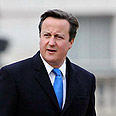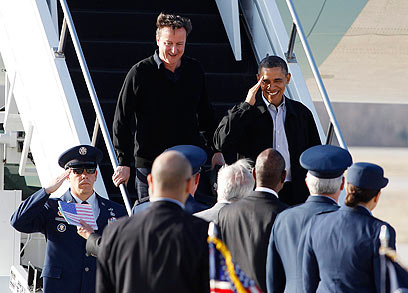
"I don't think as we stand today that military action by Israel would be justified," British Prime Minister David Cameron told NBC earlier this week regarding the threat of a nuclear Iran.
During the interview, which was aired overnight Friday (Israel time), Cameron said, "I don't think the Israelis should take that action now. We told them they shouldn't and said we wouldn't support it if they did. We've been very clear."
Related articles:
- Diplomats: US issued ultimatum to Iran via Russia
- Netanyahu at AIPAC: A nuclear Iran must be stopped
- Obama: US will always have Israel's back
- Obama: US will always have Israel's back
Speaking to NBC's Brian Williams at Number 10 Downing Street, the British premier said he was a "friend of Israel" and that Israel has a "right to exist as a democratic state."
Cameron, who is visiting the US, added that "It's very, very important it (Israel) knows it has strong allies like America, like the United Kingdom, but I don't support action now because, frankly, we've got more road to run in putting in place sanctions and putting in place tough measures against the regime and saying to them they need to take a different path.

Cameron with Obama during US visit (Photo: Reuters)
"They (Iranians) can have civil nuclear power. If they give up the ambition of having military nuclear power, they can have a future as a country that has more normal relations with the rest of the world. We need to keep up the pressure to encourage them to make the right choice," he said.
According to Cameron, the preferred course of action at this juncture would be "massive pressure" on Iran. However, he stressed that Britain and the US don't rule out taking action.
"But that's not where we are right now. Right now, turn up the pressure. Get the Iranians to think again," he said.
Asked by Williams whether the Iranian nuclear crisis was tougher to deal with "when the Israelis say this is about us, about our existence," Cameron replied: "I completely understand why the Israelis feel as strongly as they do. I feel strongly. I do not want to see an Iran with a nuclear weapon.
"This is, of course, about Israel and the Middle East because a nuclear weapon (could fall in the hands of a) state that wants to wipe Israel off the map. Countries that don't have nuclear weapons would want to acquire them. This is about our own security," he told NBC's Williams.
"There are risks that Iran would have the capabilities to attack further. I'm quite clear this is in our interest that Iran doesn't have a nuclear weapon. That's why with allies, we are piling on the pressure. We always work together, always will."
US President Barack Obama made similar remarks during a recent AIPAC conference. "We all prefer to resolve this issue diplomatically. Having said that, Iran’s leaders should have no doubt about the resolve of the United States, just as they should not doubt Israel’s sovereign right to make its own decisions about what is required to meet its security needs," he said.
Meanwhile, the world's biggest electronic payment system is expected to cut off Iranian banks blacklisted by the European Union in an attempt to further strangle Tehran's ability to finance a nuclear program.
Belgium-based SWIFT, which facilitates the bulk of global cross-border payments, said it would disconnect designated Iranian financial firms from its messaging system on Saturday at 1600 GMT after European regulators ordered the company to do so.
"The EU decision forces SWIFT to take action," SWIFT Chief Executive Lazaro Campos said in a statement on Thursday. "Disconnecting banks is an extraordinary and unprecedented step for SWIFT. It is a direct result of international and multilateral action to intensify financial sanctions against Iran."
SWIFT, or Society for Worldwide Interbank Financial Telecommunication, has been described as the glue of the global banking system, handling daily payments estimated at more than $6 trillion.
Reuters contributed to the report
- Receive Ynetnews updates
directly to your desktop















